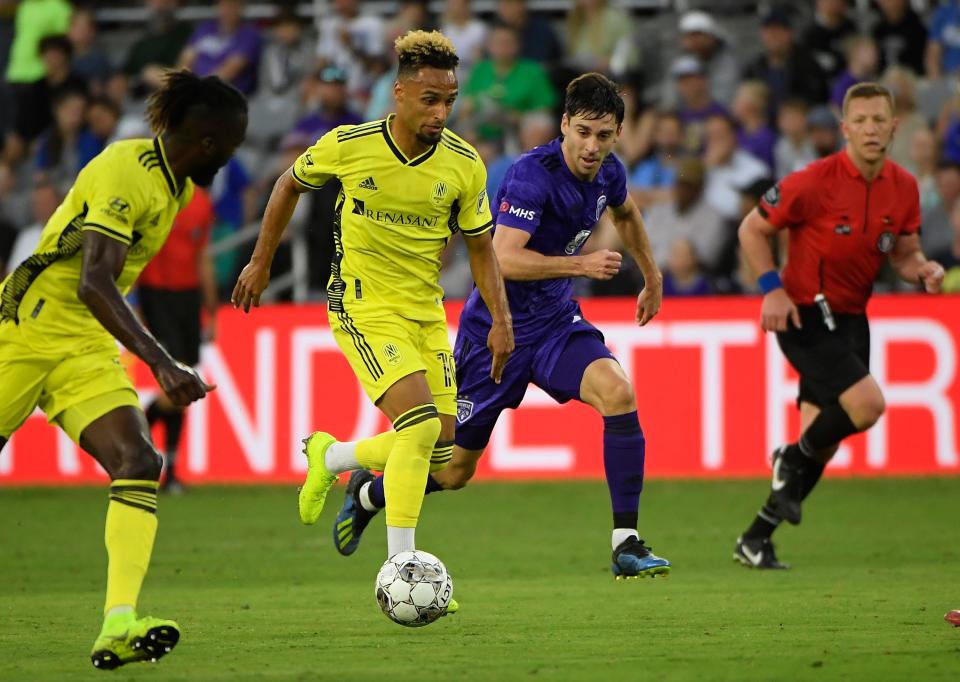Would promotion and relegation ever work in Major League Soccer? | Estes
- Oops!Something went wrong.Please try again later.
LOUISVILLE, Ky. – Hany Mukhtar appreciates a good soccer venue.
There’s his own, of course. So much is being made about Nashville SC’s swanky new home that the club's star player didn’t expect a similar experience just a few hours up the road. Not against a lower-division opponent from the USL Championship.
“I’m surprised,” said Mukhtar, exiting Louisville City FC’s Lynn Family Stadium after scoring the winning goal in Nashville’s 2-1 victory in Wednesday's U.S. Open Cup game. “Really, I enjoyed playing in that stadium. It's a gorgeous stadium.”
Such an occasion brings to mind a question that gets asked – and dismissed – a lot:
Will there ever be promotion and relegation in North American soccer leagues as in other countries across the globe?
Personally, I’d love to see it.
Even though I know that many who are knowledgeable about the game in the United States probably just laughed at the notion. And I understand why.

Major League Soccer is too new. Too many hurdles. Too many MLS owners who have invested far too much to risk blowing it with relegation after one poor season. Too many salary rules in MLS that have been and remain necessary to help the league and its teams capture and keep interest and support.
And yet, if there is any distant hope somewhere in the future, I believe it’ll be in evenings like this Wednesday in Louisville. When the big club visits the smaller one and there isn’t much difference between them – on the field, but more so off of it.
When the big guys head home talking, as Nashville SC coach Gary Smith did, about how “absolutely fantastic” the setting and opponent happened to be.
“I’ve been looking forward to coming here,” Smith said. “I’ve seen a lot of their games. There’s a piece of me that still looks at the USL an awful lot. A lot of teams that we had some tough, tough encounters against. These (against Louisville) were the toughest. No doubt about it.”

There is history between these clubs, though it is in Nashville SC’s past life. It dates back to when Smith coached Nashville prior to its 2020 debut as an MLS expansion team.
Were it not for the U.S. Open Cup and the luck of the tournament’s Round of 16 draw, these two regional rivals wouldn’t have faced each other Wednesday – or perhaps ever again in a meaningful contest. Louisville’s USL Championship is essentially the Triple-A to the big leagues of the MLS. Rarely do the two leagues meet in anything other than exhibitions or special Cup games like these.
That’s kind of a shame. Because Louisville City FC is showing that you don’t have to be an MLS franchise to act – and spend – like one. As such, Louisville is showing the rest of USL what it’ll take.
The club’s $65 million soccer-specific stadium opened in 2020, two years after Louisville won its second USL title in a row. If promotion existed, this wouldn’t just be an MLS team by now. It’d be a highly competitive MLS team.
Louisville has retained key players for years, and it is developing local talent. It invested $15 million in training grounds – shared with Racing Louisville, an expansion National Women’s Soccer League club – that would exceed those for many MLS clubs, said James O’Connor, LouCity’s former coach and current team president.

“We would definitely be big advocates of promotion,” O’Connor said, “because we feel as if over the years historically we’ve been pretty consistent. … From an infrastructure standpoint, we definitely feel as if we are building something really special here.”
And yet, building to what, exactly?
While winning games and building posh surroundings, Louisville’s club has also watched as nearby Cincinnati, Nashville and St. Louis landed MLS expansion teams.
USL is not a feeder system for MLS and never has been. Rarely do MLS clubs sign USL talent, which is odd but simply a fact. USL clubs also don't have the same salary restrictions that MLS clubs do, which means there's nothing preventing USL teams from spending as much as they want to build rosters.
The proper investment could make this more competitive. O’Connor said he looks at MLS and USL as rival leagues, basically. That's healthy. Such an approach at the USL level could make promotion and relegation more realistic in the future.
“As both leagues evolve and US Soccer starts to look at things,” O’Connor said, “I do think there eventually will come a situation where maybe there’s two really strong leagues and there’s promotion and relegation and the gap between those leagues isn’t that significant. I think that’s what could potentially happen.”
Really?
Now let’s consult the other side of the stadium.
“Never say never,” said Nashville CEO Ian Ayre, formerly boss at Liverpool in the English Premier League. “However, I do not see it happening in Major League Soccer -- at least not in my lifetime.”
It's a lack of stability with MLS being a relatively new league, Ayre said.
“Until those 30 or so teams in MLS are solid, in great stadia, with strong support and strong revenue streams cemented in place, I don’t think it makes sense to have two or three teams drop out each year,” he said. “If anything, that would stop owners and investors investing further in their teams and infrastructure, if they thought there was risk that they could be playing second-tier soccer in a year’s time. …
“With some of the good it brings, (promotion and relegation) also brings a lot of problems. Teams that fall out of the top league or down several leagues often disappear out of sight due to big financial problems. Teams trying to push for promotion face similar challenges where throwing everything they have at promotion often can result in failure and financial ruin. Teams that get promoted have to invest heavily to stay up, and if that fails, they spend years trying to rebalance their finances.”
A bit of a buzzkill maybe, but Ayre's warnings aren't wrong.
They are wise.
They also explain why MLS – a league still growing and expanding – isn’t going to have any interest in pursuing promotion and relegation anytime soon.
You may not like it, as the late, great "Macho Man" Randy Savage said, but accept it.
In the meantime, the concept will be fun to think about.
Especially on a night like this one in Louisville, where Nashville SC had to dig deep to beat a minor-league opponent in a high-level setting.
Reach Tennessean sports columnist Gentry Estes at gestes@tennessean.com and on Twitter @Gentry_Estes.
This article originally appeared on Nashville Tennessean: Would promotion and relegation ever work in Major League Soccer?

